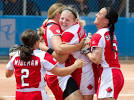TORONTO — Feeling a summer-sport void now that the Pan American Games are over? It won’t last long — the opening ceremonies for the 2016 Summer Olympics are just over 13 months away.
Canada’s objective in Rio de Janeiro is a top-12 finish in total medals among the 200-plus participating countries.
For that to happen, Canada’s divers, swimmers, rowers, wrestlers and paddlers need to come through, augmented by some track and field, cycling and trampoline medals.
Those sports are the most heavily funded in Canada based on Olympic medal potential. Many are sports in which athletes can win multiple medals at one Olympic Games.
“They’re the bread and butter,” Own The Podium chief executive officer Anne Merklinger said. “If we don’t perform well in those sports in terms of multi-medal potential, then we’re going to struggle to meet our targets.”
Canada’s eventual goal at the Summer Games is to finish in the top eight, but it will take a strong performance to crack the top dozen in Rio.
Canada finished 14th in total medals with 18 in Beijing in 2008. The country moved up one spot winning the same number in London, but earned fewer gold and silver medals.
Merklinger said winning more than 18 medals is an objective for Rio. Canadian Olympic Committee chief sport officer Caroline Assalian said the COC’s focus is the top-12 result.
“The reality is all sports have to come through because one or two medals made the difference between 13th and finishing 11th,” Assalian said. “Every single medal counts.”
Own The Podium doles out funding to Canada’s sport federations based on Olympic medal potential. Canada’s taxpayers are the biggest contributor via Sport Canada, although the COC contributes money to its coffers from its corporate sponsorship campaigns.
OTP doles out about $35 million annually for summer sport.
The 2015 world championships are the best performance-on-demand indicator of which athletes are tracking towards a medal in Rio. The majority of world championships are still upcoming, with the world aquatic championships just underway in Kazan, Russia.
Of the athletes who were top-five in their respective world championships in 2011, 60 per cent produced an Olympic medal a year later in London. The conversion rate in Beijing was 67 per cent.
“Our best conversion rate was 67 per cent,” Assalian said. “That is absolutely our goal as well.”
Canada’s performance at the Pan American Games in Toronto also rated as a measuring stick for Rio for OTP and the COC. Canadians won a Pan Am record 217 medals, including 78 gold.
“Winning a medal in any Games is an important point in an athlete’s career,” Merklinger said. “Winning one at home in this kind of environment that people have referred to as a mini-Olympics is even more important.
“There’s been performances here where athletes have exceeded expectations because they’re performing on demand, they handled the environment so well.”
The federal government provided an extra $3 million to OTP for the 2015 Pan Am/Parapan Am Games to assist athletes with medal potential across all the sports — not just Olympic and Paralympic sports.
An important distinction in summer sport in Canada is there is a pot of money devoted to team sports not currently tracking for an Olympic medal.
Team sports are traditionally a weakness for Canada at Summer Games, but the women’s soccer team’s bronze in London and their dramatic semifinal loss to the U.S. resonated at home.
Women’s soccer and women’s rugby sevens currently receive “core” OTP funding because they have medal potential in Rio.
But the 2015-16 funding recommendation for women’s and men’s basketball, men’s rugby sevens, men’s volleyball, women’s and men’s water polo and women’s field hockey is a combined $5.6 million.
Team sports are expensive because several athletes need to be funded for only one medal, but Assalian and Merklinger both say the impact it has on Canadians makes it worth the money.
“There’s just something about team sports. They unite people,” Assalian said.
“I think the fact a tournament lasts at least a week . . .. and the athletes from a team sport come from all over the country, there’s something about team sports that rallies a team, a country, a city like no other individual sport.”
Added Merklinger: “There are other nations we know that have said ‘we cannot afford to invest in team sports.’ That is not Canada’s position.”




